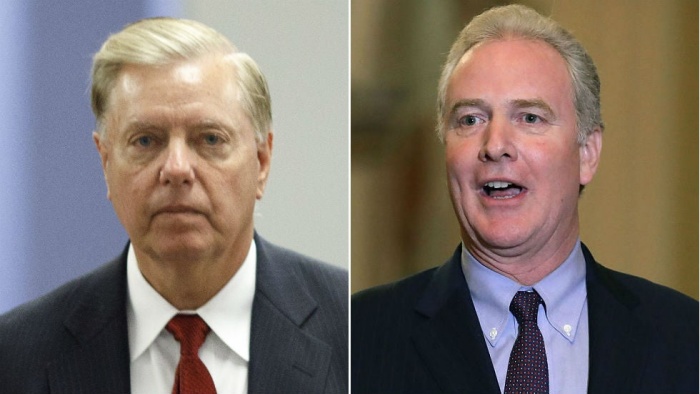US Senators Chris Van Hollen and Lindsey Graham warned Turkey on Tuesday that bipartisan sanctions legislation would be introduced unless Ankara agrees to a ceasefire and demilitarized zone with Syrian Kurdish forces.
The ultimatum follows escalating violence in northeast Syria after the fall of Bashar Assad’s regime.
Attacks from Turkish-backed forces on our Syrian Kurdish partners undermine regional security & efforts to prevent an ISIS resurgence. Turkey must accept a ceasefire & demilitarized zone or we’ll move forward with bipartisan sanctions legislation.
My statement with Sen. Graham: pic.twitter.com/TzOa1DrrAD
— Senator Chris Van Hollen (@ChrisVanHollen) December 17, 2024
The senators emphasized the importance of extending and solidifying a US-mediated ceasefire in the flashpoint town of Manbij, which was temporarily renewed on Tuesday.
“While Turkey has some legitimate security concerns that can be addressed, these developments are undermining regional security, and the United States cannot sit idly by,” Van Hollen and Graham said in a joint statement.
The extension of the ceasefire, brokered by the US, aims to prevent further escalation between Turkish-backed forces and the Syrian Democratic Forces (SDF), a key US ally in combating the Islamic State in Iraq and the Levant (ISIL). The State Department confirmed on Tuesday that the truce would last through the end of the week.
“We will obviously look to see that ceasefire extended as far as possible into the future,” spokesperson Matthew Miller said.
Turkey has increased attacks on Kurdish forces since Assad’s fall, rejecting offers for a demilitarized zone near Kobani and other key areas. Ankara views the SDF as linked to the Kurdistan Workers’ Party (PKK), a group designated as a terrorist organization by both Turkey and the US. The senators warned that Turkey’s actions threaten the critical mission to prevent an ISIL resurgence.
Van Hollen and Graham said they are prepared to reintroduce sanctions similar to those enacted in 2019, which pressured Turkey into a ceasefire with Kurdish forces. Proposed measures include freezing the assets of senior Turkish officials, banning US military aid to Turkey and requiring that the US Treasury implement the delayed sanctions over Turkey’s purchase of the Russian S-400 missile system. The legislation also seeks transparency in President Recep Tayyip Erdoğan’s financial assets amid allegations of a vast fortune in ill-gotten gains.
During a press conference on Monday President-elect Donald Trump signaled reluctance to engage in Syria, stating, “The US should have nothing to do” with the conflict. Trump, who sought to withdraw US troops backing the SDF during his first term in office, praised Erdoğan as someone he “got along with great” and suggested Ankara would take a leading role in the region. “I believe it’s Turkey,” he said of the conflict’s outcome. “But Turkey did an unfriendly takeover without a lot of lives being lost.”
The Biden administration, meanwhile, has engaged in diplomatic efforts to maintain the fragile ceasefire while addressing Turkey’s security concerns. “We understand the very legitimate concerns that Turkey has about the terrorist threat PKK poses,” Miller said. “But we are also working to ensure stability in the region.”
The fall of Assad has left Kurdish groups in a precarious position, with the SDF raising a new national flag under US encouragement while expressing concerns about losing autonomy gained during Syria’s civil war.
“Ultimately, what we want to see is a Syrian national government that encompasses all the various ethnic groups inside Syria,” Miller said.
The senators reaffirmed their commitment to Kurdish partners, describing the SDF as the “tip of the spear” in the fight against ISIL. “Turkey must accept a ceasefire and demilitarized zone or we’ll move forward with bipartisan sanctions legislation,” Van Hollen tweeted.
The extended truce offers a temporary reprieve, but the situation in Syria remains volatile. US efforts to mediate between Ankara and Kurdish forces will determine whether the ceasefire can be transformed into a sustainable solution or if sanctions will escalate tensions further.
